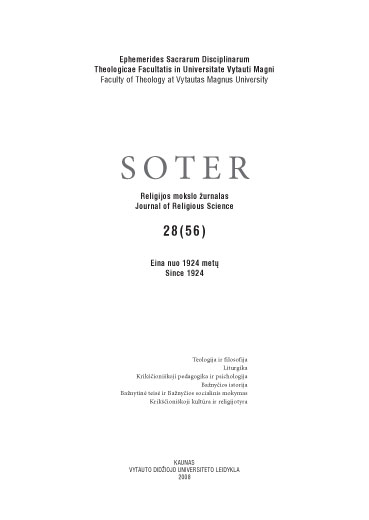Neotomistinė, egzistencialistinė ir personalistinė filosofija
NEOTHOMISTICAL, EXISTENTIAL AND PERSONAL PHILOSOPHY ABOUT CHRISTIAN CHILDREN’S EDUCATION
Author(s): Juozas Vytautas Uzdila, Inesė RatnikaitėSubject(s): Christian Theology and Religion
Published by: Vytauto Didžiojo Universitetas
Keywords: neothomism; Christian existentialism; personalism; hodegetics; personality; being; existence; free choice
Summary/Abstract: Philosophical ideas enable to adapt them to the philosophy of Christian education and investigate specific phenomenon that disappears in the process of education. In the article we are referring to the three philosophical schools: neothomism, Christian existentialism and personalism. Neothomistic point of view allows the philosophy of education to treat a man as a creation of God. Man’s only principle of existence is God. God not only called a man to the existence, He takes care of him. It helps to define a task of education - to trust the Creator, to believe in His decisions, to let be governed by God, who is Wisdom, Love, and Truth. God is presented as a loving Father in the philosophy of education. It is important for a child to know that God always loved him and will love with unconditional love. The most important thing is that God loves a child as he is - sometimes week, angry, harmed, having doubts, desiring revenge, “bad”. There is an elevated individuality of a man and personal bond with religion in the pedagogics of existential education. Every child is individual and valuable. It is important to create conditions for everyone to look for a personal bond with God. It is impossible to experience God through others. An educator cannot eliminate faith. He can give some religious knowledge. The most important thing is to seek individual, personal bond with God. On the other hand, natural relation with religion is frightening and threatening. The goal of religious education is to present child two sides of life. One is inescapable suffering, and pain. The other is the possibility to know faith and to experience happiness among the absurdities. A task of religious pedagogics is to teach children that life is not only seeking of pleasures or avoiding of suffering and pain. The end of life is to understand the meaning of life. Education should seek to distract from false temptations of life. Existential thinking of children with bad experience of life can help them to take it easy. The existential philosophical point of view helps not to stay in the past, live with bad memories but to concentrate on the present and to look to the future. Existential individualism partly is opposed to a person, and personality in personalism. A personality is not given; it is created through everyday efforts. Only in the relation with divinity, an individual can get rid of the existence of lower level and reach the highest form of being - to become a person who is able to use the presence of divinity that is freedom. A man is free to make decisions if he wants to become a person or if he doesn’t. Freedom is connected with man‘s responsibility to himself, his actions and other people. It is important in Christian education to help children understand that freedom always obliges and that a man cannot be free if he makes others to satisfy his caprices. Man becomes free when he realizes his responsibility. To realize responsibility is to go through it. The matur
Journal: SOTER: religijos mokslo žurnalas
- Issue Year: 56/2009
- Issue No: 28
- Page Range: 35-50
- Page Count: 16
- Language: Lithuanian

